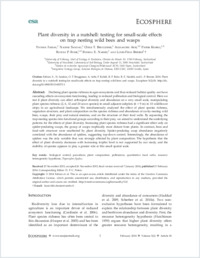Plant diversity in a nutshell: testing for small-scale effects on trap nesting wild bees and wasps
- Fabian, Yvonne University of Fribourg, Unit of Ecology Evolution, Switzerland
- Sandau, Nadine University of Fribourg, Unit of Ecology Evolution, Switzerland
- Bruggisser, Odile T. University of Fribourg, Unit of Ecology Evolution, Switzerland
- Aebi, Alexandre University of Fribourg, Unit of Ecology Evolution, Switzerland - University of Neuchâtel, Laboratory of Soil Biology, Switzerland
- Kehrli, Patrik University of Fribourg, Unit of Ecology Evolution, Switzerland - Station de recherche Agroscope Changins, Nyon, Switzerland
- Rohr, Rudolf P. University of Fribourg, Unit of Ecology Evolution, Switzerland - Integrative Ecology Group, Estacion Biologica de Doñana, Sevilla, Spain
- Naisbit, Russell E. University of Fribourg, Unit of Ecology Evolution, Switzerland
- Bersier, Louis-Félix University of Fribourg, Unit of Ecology Evolution, Switzerland
-
01.02.2014
Published in:
- Ecosphere. - 2014, vol. 5, no. 2, p. art18
English
Declining plant species richness in agro-ecosystems and thus reduced habitat quality can have cascading effects on ecosystem functioning, leading to reduced pollination and biological control. Here we test if plant diversity can affect arthropod diversity and abundance on a very small scale, manipulating plant species richness (2, 6, 12 and 20 sown species) in small adjacent subplots (6 × 9 m) in 10 wildflower strips in an agricultural landscape. We simultaneously analyzed the effect of plant species richness, vegetation structure, and plant composition on the species richness and abundance of cavity-nesting wild bees, wasps, their prey and natural enemies, and on the structure of their food webs. By separating the trap-nesting species into functional groups according to their prey, we aimed to understand the underlying patterns for the effects of plant diversity. Increasing plant species richness had a significant effect only on spider-predating wasps, the group of wasps trophically most distant from plants. In contrast, bees and food-web structure were unaffected by plant diversity. Spider-predating wasp abundance negatively correlated with the abundance of spiders, suggesting top-down control. Interestingly, the abundance of spiders was the only variable that was strongly affected by plant composition. The hypothesis that the effect of plant diversity decreases with increasing trophic level is not supported by our study, and the mobility of species appears to play a greater role at this small spatial scale.
- Faculty
- Faculté des sciences et de médecine
- Department
- Département de Biologie
- Language
-
- English
- Classification
- Ecology and biodeversity
- License
- License undefined
- Identifiers
-
- RERO DOC 209875
- DOI 10.1890/ES13-00375.1
- Persistent URL
- https://folia.unifr.ch/unifr/documents/303522
Statistics
Document views: 137
File downloads:
- ber_pdn.pdf: 168
